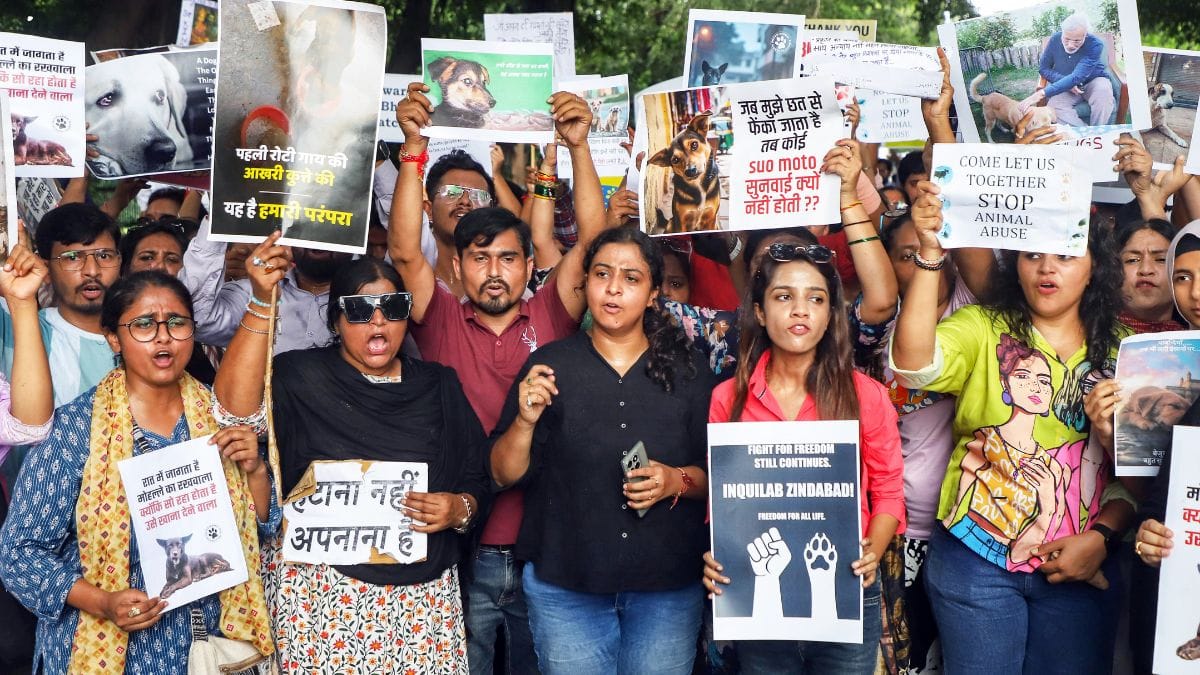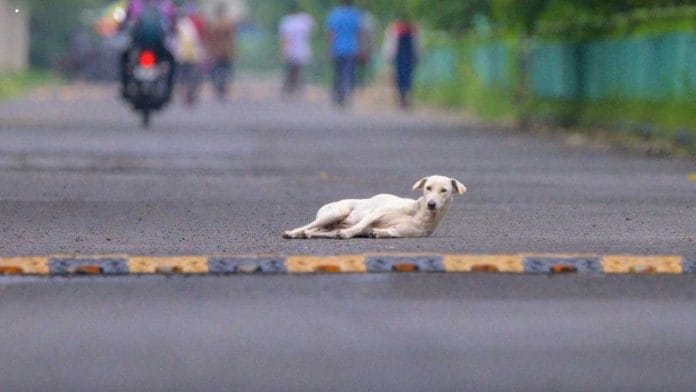New Delhi: The Municipal Corporation of Delhi (MCD) has drawn up a three-phase plan to implement the Supreme Court’s 11 August directive on stray dogs even as a larger bench has reserved its order on pleas challenging it.
As part of the first phase, the MCD has notified all NGOs engaged in sterilisation and immunisation of stray dogs in Delhi to pick up “all ferocious/aggressive/habitual biting stray dogs initially from vulnerable points like govt offices, hospitals, schools, parks, colonies and institutes” and keep them in Animal Birth Control (ABC) centres.
MCD Deputy Director (Veterinary Services) Dr S.K. Yadav told ThePrint that the first phase is already ongoing wherein the 20 ABC existing centres of the city will be utilised for keeping the dogs. These centres have a collective capacity of 2,100 dogs. Nearly 900 are already housed there, so this leaves room for around 1,200 more.
“If we get the funds on time, then it will take a little more than eight weeks, but we can implement (the remaining phases of) the plan,” Yadav told ThePrint.
While the second phase involves building additional shelters with larger spaces, the final phase envisages “mass relocation” of stray dogs.
The 11 August order had set an eight-week deadline for authorities concerned to round up all stray dogs in the Delhi-National Capital Region (NCR) and move them permanently to designated shelters. On 14 August, a three-judge bench heard pleas challenging the 11 August order seeking a stay, and reserved its judgement.
According to a senior MCD official, priority is being given to capturing “ferocious dogs”, identified on the basis of complaints received from different zones of the civic body.
On Tuesday, the day the MCD issued its notification on capture of “ferocious dogs”, the central government informed the Lok Sabha that in the past year, it has issued two advisories “reiterating that sterilisation is central to stray dog population management”.
The same day, Chief Minister Rekha Gupta reportedly instructed all concerned authorities to refrain from any “harsh actions” against stray dogs until the Supreme Court announces its final order.
“That the MCD is doing this contrary to what the central government is saying out loud, and what our own chief minister is directing, shows the malafide with which it is proceeding, without any concern for the care and intent of the law,” lawyer and animal rights activist Gauri Puri told ThePrint.
Puri added that the MCD’s actions “violate” Rule 16 of the ABC Rules 2023, which pertains to ‘Resolution of complaints regarding dog bites or rabid dogs’.
Rule 16 states that in case of a complaint, a suspected rabid dog must be subjected to “inspection by a panel of two persons and the like a veterinary surgeon appointed by the local authority and a representative from an Animal Welfare Organisation”.
If there is a high probability of the dog having rabies, it is to be isolated till it dies a natural death, the rule states, adding the death normally occurs within ten days of contracting rabies.
If the dog is found not to have rabies but some other disease or is “furious in nature”, it would be
handed over to the Animal Welfare Organisation “who shall take the necessary action to cure and release the dog after ten days of observation”.
Following the Supreme Court’s 11 August order, the MCD has instructed the ABC centres not to release the dogs already in their custody. As ThePrint reported earlier, some centres are running at full capacity, hampering sterilisation work.
Also Read: Dog bites & rabies deaths: What data reveals about complex crisis behind stray dogs debate
2nd & 3rd phases
In its second phase, the MCD plans to build shelters capable of accommodating 1,000–1,500 dogs. A 2.5–3 acre government plot in Dwarka has been identified for this purpose, Yadav said. “We will make separate sheds for them. Five to seven dogs will be kept in one cage.”
Additional shelters could be created on land adjoining three government veterinary hospitals—Bijwasan, Ghazipur, and Mundhela Kalan—which have open space available. This, the veterinary services deputy director said, would allow for about 3,000 dogs to be relocated in this phase.
For the final phase, which will be the largest, the MCD has earmarked 82 acres of land in Ghogha, a village in Narela Tehsil, which Yadav said “can house several lakhs of stray dogs”.
Another senior MCD official told ThePrint that with the Supreme Court order reserved, enforcement for now is limited to catching “aggressive dogs”. There has also been resistance from the public. MCD teams in Rohini were attacked by local residents while attempting to pick up strays, another official claimed.
Delhi is home to an estimated 8–10 lakh stray dogs. According to MCD data, sterilisation numbers have risen in recent years, with 59,076 procedures carried out in 2022–23, 79,959 in 2023–24, and 1,31,137 in 2024–25. In the first four months of the 2025 financial year (April–July), 39,000 dogs have been sterilised.
In a response to an RTI application filed by animal rights activist Gauri Maulekhi, the MCD informed that Rs 12 crore was allocated for sterilisation and immunisation of stray dogs in 2023–24, of which Rs 9.57 crore was utilised. In 2024–25, the allocation rose to Rs 15 crore while the expenditure stood at Rs 13.04 crore. For 2025–26, Rs 15 crore has been allocated, but no expenditure has been recorded, so far.
‘Individuals may disagree on which dog is ferocious’
Senior Advocate Percival Billimoria has written to Delhi MCD Commissioner Ashwani Kumar, urging that the civic body wait till the larger bench give its decision on the stray dogs issue.
“Reliance solely on the order of 11 August to remove dogs is highly irregular given that the order of a larger bench on the same subject matter is awaited,” he wrote.
Billimoria too referred to Rule 16 of the ABC Rules, stating that the “ABC Rules are a part of the statute itself and have been recognised as such in several judgments and orders of the Supreme Court”, but the MCD notification “does not clarify that the provisions of Rule 16 ought to be followed in letter and spirit”.
The letter further states that the notification does not clarify on what basis “ferocious/aggressive/habitual biting” are expected to be identified. “It is well known that civil society comprises individuals who may disagree on which dog is ferocious, aggressive etc.”
Animal welfare organisations continue to argue that sheltering is not a solution, and that the focus should remain on sterilisation.

“The order has become a sweeping incarceration of all dogs,” said Geeta Seshamani, co-founder of Wildlife SOS and vice-president of Friendicoes SECA. She argued that it unfairly punishes “a huge majority of docile, sterilised, vaccinated, gentle, community street pets for the sins of a few biters”.
Adnan Khan, founder of the dog training centre K9 School, warned that the plan to cluster thousands of dogs in one place is a “death sentence” in practice, adding that dogs from different territories, once crowded together, would fight, suffer injuries, spread infections, and die unattended.
“Which handler, which vet is going to go and treat 3,000 fighting, wounded dogs?” he asked.
Both Seshamani and Khan stressed that instead of creating “pools of infection and chaos” by hoarding the strays, authorities should invest in strengthening sterilisation drives, the only scientific solution to managing stray populations.
Poor ABC implementation culminated in SC order: Maneka Gandhi
BJP ex-MP Maneka Gandhi has written to Delhi Chief Minister Rekha Gupta highlighting what she described as “grave lapses” and a “complete lack of oversight” in the implementation of the ABC programme in the capital.
In her letter, Gandhi expressed concern that these failures had culminated in the Supreme Court’s 11 August order.
She alleged that the court was misled into believing that the ABC programme had failed, whereas, in her view, the scheme was never properly implemented.
(Edited by Tony Rai)






